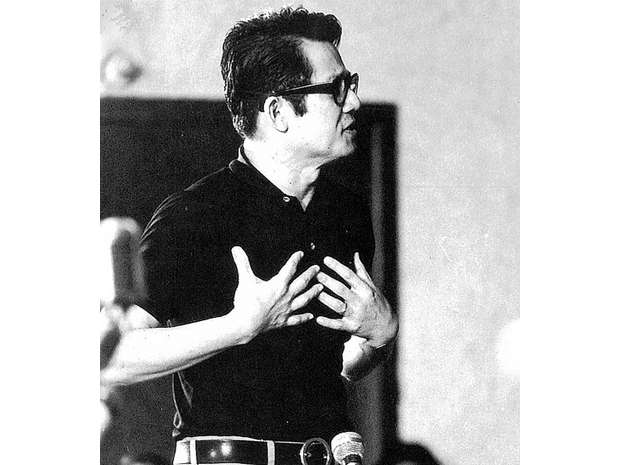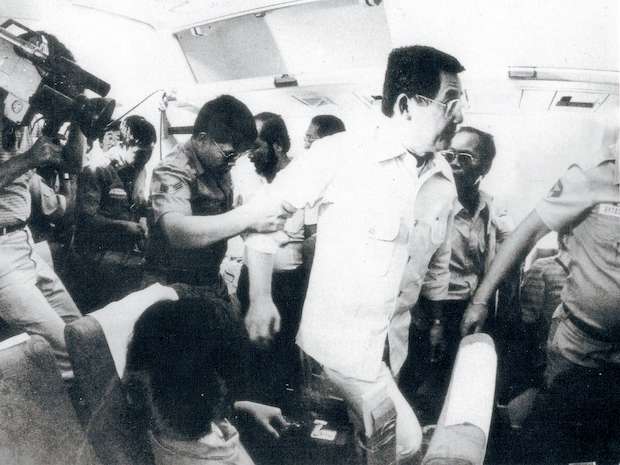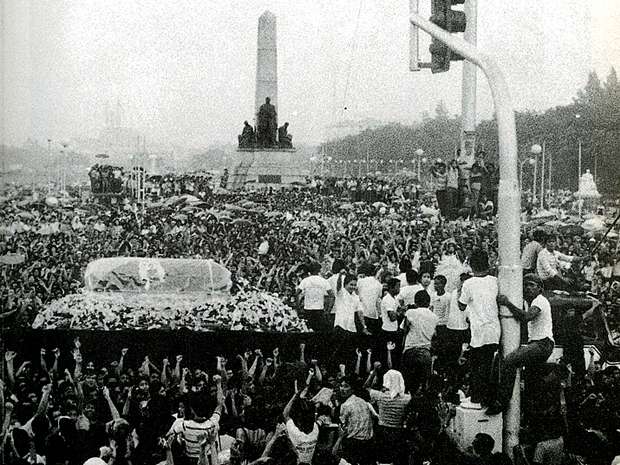Art and Culture
The Lost Speech

The late Sen. Ninoy Aquino. Photo courtesy of Choose Philippines.
The EDSA revolution—the first one, to be more precise—took place between February 22-25, 1986, almost three years after Ninoy’s death. Led by his dear wife, Cory Aquino, the people took it to the streets and sent the Marcos family (and their posse) packing.
The revolution was broadcasted worldwide and inspired so many people all over the globe. It was dubbed the “People Power Revolution.”
Today, as we remember the 28th anniversary of the EDSA People Power Revolution, we commemorate one of its heroes.
Despite his absence, Ninoy Aquino served as an inspiration not just to his wife and family, but to a grieving nation longing for freedom and fighting for its right.


Ninoy Aquino’s arrival. Photo courtesy of Choose Philippines.
The speech he never got to read
August 21, 1983 was more than just a Sunday.
To some, it was the death of democracy. The death of hope, of liberty, of an end to tyranny. To a few, it must have felt like victory.
The late Senator Benigno “Ninoy” Aquino Jr. was brutally assassinated that Sunday just as he was emerging from his plane at the tarmac of then Manila International Airport. A couple of shots were fired and he fell from the plane. He was dead on the spot.
Ninoy prepared a speech prior to his arrival. The speech he never got to deliver.
According to his speech, he came back to the country despite his mother’s advice after being exiled in Boston, Massachusetts. He also knew back then that he will be stepping into darkness once more.
“I am prepared for the worst, and have decided against the advice of my mother, my spiritual adviser, many of my tested friends and a few of my most valued political mentors.
A death sentence awaits me. Two more subversion charges, both calling for death penalties, have been filed since I left three years ago and are now pending with the courts,” he wrote.
Yet in spite of those charges, he decided to come back home to set things right.
“I have returned on my free will to join the ranks of those struggling to restore our rights and freedoms through non-violence. I seek no confrontation. I only pray and will strive for a genuine national reconciliation founded on justice,” he said in his speech.
Ninoy knew that “in a revolution there can really be no victors, only victims. We do not have to destroy in order to build.” Hence, his peaceful approach.


Ninoy’s death procession. Photo courtesy of Choose Philippines.
He chose not to follow the easy path even if he knew it could cost him his life.
“I could have opted to seek political asylum in America, but I feel it is my duty, as it is the duty of every Filipino, to suffer with his people especially in time of crisis. I never sought nor have I been given any assurances, or promise of leniency by the regime. I return voluntarily armed only with a clear conscience and fortified in the faith that in the end, justice will emerge triumphant,” he said.
He longed to end the spilling of more innocent blood in his homeland. He mentioned in his speech that the country moved backward—into tyranny and violence—rather than move forward with the regime.
In his speech, Ninoy listed the atrocities of Martial Law. The deterioration of human rights, the massive increase in extrajudicial killings, twisted laws, the suppression of free speech and even businesses to freely run, and the imprisonment of the innocent.
He pointed out that for a fallen economy such as the Philippines’ “to get going once again,” owners must be given hope and workers should be given their fair share for their toils.
And then he called for unity.
“The country is far advanced in her times of trouble. Economic, social and political problems bedevil the Filipino. These problems may be surmounted if we are united. But we can be united only if all the rights and freedoms enjoyed before September 21, 1972 are fully restored,” he pointed out.
“The Filipino asked for nothing more, but will surely accept nothing less, than all the rights and freedoms guaranteed by the 1935 constitution – the most sacred legacies from the founding fathers.
Yes, the Filipino is patient, but there is a limit to his patience. Must we wait until that patience snaps?”
Apparently, yes. The Filipino’s patience was stretched to the thinnest strand, until it can no longer contain it and it exploded onto EDSA three years later.
It seems like as if he has foreseen the revolution as proven by his speech.
“The nationwide rebellion is escalating and threatens to explode into a bloody revolution. There is a growing cadre of young Filipinos who have finally come to realize that freedom is never granted, it is taken,” he wrote.
And yet Ninoy longed to end things in a non-violent manner, so he used his speech to deliver his terms and to keep everything peaceful and black-and-white despite knowing that “there can be no deal with a dictator. No compromise with dictatorship.”
“Order my immediate execution or set me free.”
They said that a man who has lived a full life is not afraid to die. In his speech, he proved that saying true.
In 1977, he was sentenced to die before a firing squad by a military tribunal for allegedly being the nation’s communist leader.
“I am not a communist, never was and never will be,” Ninoy wrote.
He said that “Subversion stems from economic, social, and political causes and will not be solved by purely military solution: It can be curbed not with ever increasing repression but with a more equitable distribution of wealth, more democracy and more freedom.”
Perhaps the government back then was mistaking Ninoy’s subversion with communism.
At the last part of his speech, Ninoy quoted Archibald Macleish as written along the corridors of Harvard University.
“How shall freedom be defended? By arms when it is attacked by arms; by truth when it is attacked by lies; by democratic faith when it is attacked by authoritarian dogma. Always and in the final act, by determination and faith.”
And Ninoy added, “faith in our people and faith in God.”
A man’s legacy truly lives on after he himself passes away.
He wrote, “According to Gandhi, the willing sacrifice of the innocent is the most powerful answer to insolent tyranny that has yet been conceived by God and man.”
– – –
Read Ninoy’s full speech: Ninoy’s Arrival Speech transcribed by The Official Gazette.





















